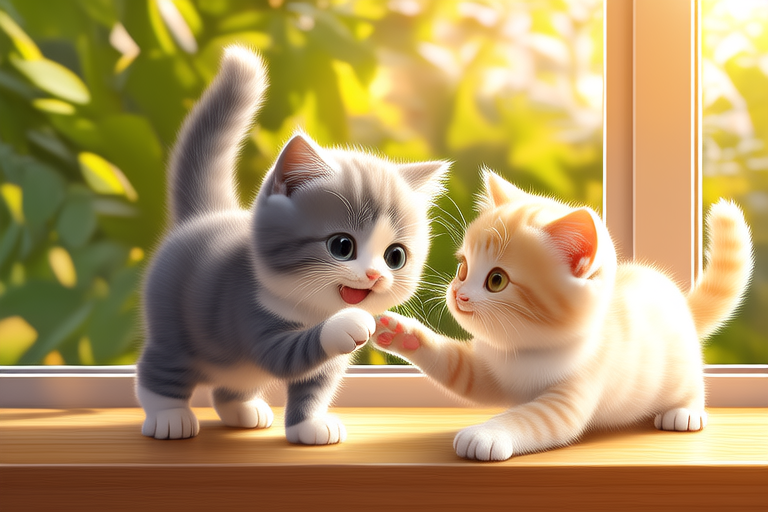Adorable Munchkins: The Pawsitively Unique Short-Legged Cats
Welcome to the enchanting world of Munchkin cats, a breed that has captured the hearts of cat enthusiasts everywhere with their unique charm and irresistible appeal. These delightful felines stand out from the crowd due to their most distinctive feature: their exceptionally short legs. While their diminutive stature might seem like a genetic quirk at first glance, it is precisely this trait that makes Munchkin cats truly one-of-a-kind.
The Unique Physical Characteristics of Munchkin Cats
Munchkin cats are instantly recognizable thanks to their disproportionately short limbs. Their legs are typically half the length of those found in other breeds, giving them a distinctively whimsical appearance. Despite their short legs, Munchkin cats remain agile and surprisingly athletic. They move with a peculiar gait that resembles a rabbit’s hop or a miniature horse’s trot, adding to their endearing charm. Their bodies are generally well-proportioned, with a sleek and muscular build that complements their shorter legs. Munchkin cats come in a wide variety of coat patterns and colors, making each individual unique. From tabby stripes to solid hues, these cats offer endless visual delight.
The Origins of the Breed
The history of the Munchkin cat is as fascinating as the breed itself. It all began in the late 1980s when Sandra Hochenedel discovered a stray cat with unusually short legs in Louisiana. She rescued the cat and named her Blackberry. Blackberry’s offspring inherited her unique trait, and the breed was born. Hochenedel partnered with Dr. Solveig Pflueger, a genetics expert, to develop the breed further. In 1994, the International Cat Association (TICA) recognized the Munchkin as a new breed. However, the journey towards full acceptance was not without controversy.
Some critics argued that breeding for short legs could lead to serious health issues. They expressed concern about potential spinal problems and joint issues caused by the altered skeletal structure. Despite these concerns, TICA continued to support the breed, and in 2003, the Munchkin achieved championship status. This milestone marked the official recognition of the breed within the feline community.
Temperament: Playful and Adaptable Pets
Munchkin cats are known for their playful and curious nature. They possess an infectious zest for life that keeps them constantly engaged in their surroundings. Their playful antics often include chasing toys, pouncing on objects, and exploring every nook and cranny of their environment. These cats are highly adaptable, making them excellent companions for various living situations. Whether you live in a small apartment or a spacious home, a Munchkin cat will find ways to entertain themselves and bring joy to your household.
One of the most appealing aspects of Munchkin cats is their affectionate and sociable demeanor. They thrive on human interaction and form strong bonds with their owners. Munchkin cats are often described as being dog-like in their loyalty and enthusiasm. They enjoy following their owners around the house, participating in daily activities, and seeking attention through purring and gentle nudges. Their adaptability also extends to getting along well with other pets, making them ideal additions to multi-pet households.
Health Concerns and Care Tips
While Munchkin cats are generally healthy, there are some health concerns specific to the breed that owners should be aware of. The most notable issue is lordosis, a condition characterized by an abnormal curvature of the spine. This can sometimes lead to difficulty in movement or discomfort. Additionally, Munchkin cats may be prone to joint issues due to their unique skeletal structure. Regular veterinary check-ups are essential to monitor their overall health and address any potential problems early on.
To ensure the well-being of your Munchkin cat, it is important to provide them with a balanced diet rich in nutrients. High-quality cat food formulated for indoor cats or smaller breeds can help maintain their optimal weight and energy levels. Exercise is equally crucial, especially considering their playful nature. Interactive toys, scratching posts, and climbing structures can stimulate both their minds and bodies. Regular grooming is necessary to keep their coats shiny and free of mats. Munchkin cats with longer hair may require more frequent brushing to prevent tangles and matting.
Stories from Owners: Experiencing the Joy of Munchkin Cats
The love and devotion that Munchkin cat owners share for their furry friends are truly heartwarming. Many owners recount tales of their Munchkin’s unique personalities and the joy they bring into their lives. One owner, Sarah, describes her Munchkin, Whiskers, as a constant source of laughter and companionship. “Whiskers has this amazing ability to make even the worst days better,” she says. “His playful spirit and loving nature have made our home feel complete.”
Another owner, Mike, speaks fondly of his Munchkin, Luna. “Luna is incredibly smart and always knows when I need a little extra comfort,” he shares. “She has this uncanny knack for finding the perfect spot to curl up next to me whenever I’m feeling down.” Stories like these highlight the special bond that develops between Munchkin cats and their owners, creating cherished memories that last a lifetime.
In conclusion, Munchkin cats are a breed that combines uniqueness with charm, making them beloved companions for many. Their short legs and playful personalities set them apart, while their adaptability and affectionate nature make them ideal pets. By understanding the health concerns associated with the breed and providing proper care, owners can ensure that their Munchkin cats live happy and healthy lives. The joy and companionship that Munchkin cats bring into homes are undeniable, and their presence enriches the lives of those lucky enough to share their space.
